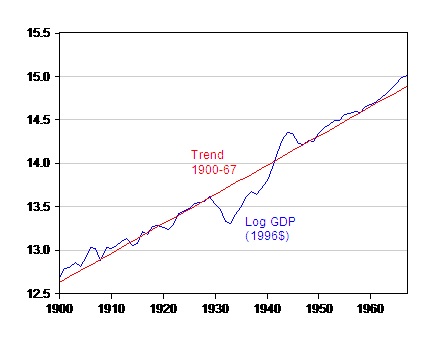Plenty of gloom out there if you’re hungry for more. But I wanted to pass along a couple of developments this week that give me some hope.
Yearly Archives: 2008
The global recession
IMF research economist
Prakash Loungani reports some statistics on the extent to which housing price declines are being seen worldwide.
The Nobel Prize in Economics to Paul Krugman
From the The Sveriges Riksbank Prize in Economic Sciences in Memory of Alfred Nobel‘s description of Krugman’s scientific contributions:
Trade and Geography — Economies of Scale, Differentiated Products and Transport Costs
By the late 1980s, researchers had begun to integrate economies of scale into general equilibrium models of location and trade, thereby giving precision to the verbal analyses of earlier researchers and adding important new insights. In the resulting work, now commonly known as the new economic geography, economic geographers made use of the new tools, along with economists who took a renewed interest in the field. Several researchers took part in these developments, but the most influential contributions were made by Paul Krugman.
The Budget Deficit…and Macro Policies Going Forward
Let’s assume the Treasury, the Fed and the rest of the community of international financial policymakers are able to stabilize the financial system. What are the fiscal options available, given the borrowing and spending policies of the Bush Administration?
From Chowdhury and Huie, “Skyrocketing Issuance,” US Economics/Strategy Weekly (Deutsche Bank, 10 Oct.) (not online):
Treasury issuance is likely to increase to extraordinary
levels over the past year. There are 3 components to the
issuance picture. The first is the traditional federal budget,
which in fiscal year 2009 is likely to increase substantially
from the 2008 deficit of around $440 bn. The second are
the various Treasury rescue initiatives that involve buying
assets or equities; only the expected net cost will be
formally recorded on the budget, but the entire gross
spending amount will be added to the issuance
requirement. Finally, the Federal Reserve’s liquidity
facilities will also add to issuance, as the Fed no longer
has capacity to sell or lend the Treasuries in its portfolio;
instead, going forward it will rely on the Supplementary
Financing Program, where the Treasury issues bills and
deposits the proceeds at the Fed, to finance its lending
facilities. In total, we expect net issuance to rise to $3.3 tn
over the fiscal year.
Shadowstats responds
Last month I called attention to an analysis by BLS researchers John Greenlees and Robert McClelland of some of the claims by John Williams of Shadowstats about the consequences for reported inflation of assorted technical decisions made by the BLS. Williams asked me to update with a link to his response to the BLS study. I am happy to do so, along with offering some further observations of my own.
Ex-oil Deficit Shrinks, but Exports Slow
Messages from the August Trade Release and the September Import/Export Price release.
The McCain and Obama Economic Advisers Debate
…at the UW-Madison. Ike Brannon spoke on behalf of the McCain-Palin campaign and Austan Goolsbee on behalf of the Obama-Biden campaign. Here’s the link to Proposals for Change (Adobe Flash required).
Prospects for Output: The WSJ Survey
The WSJ just released its newest survey of economists’ views on the course of the economy. From the article:
On average, the 52 economists surveyed now expect gross domestic product to contract in the third and fourth quarters of this year, as well as the first quarter of 2009.
This is the first time that survey forecasts for those periods have turned negative. If those predictions bear out, it would mark the first time U.S. GDP — the total value of goods and services produced — has contracted for three consecutive quarters in more than a half century. Economists put the odds of recession in the next 12 months at 89%, up from 60% in last month’s survey.
Back to the Great Depression Debates
Or…Salt Water/Fresh Water Redux!

Figure 1: Log GDP (1996$), 1900-1967 (blue line), and linear trend (red line). Source: S.B. Carter, S.S. Gartner, M.R. Haines, A.L. Olmstead, R. Sutch, G. Wright, Historical Statistics of the United States, Millenial Edition (CUP, 2006).
The IMF’s Outlook
From Chapter 1 of the IMF World Economic Outlook, released today:
The world economy is now entering a major downturn
in the face of the most dangerous shock in mature
financial markets since the 1930s. Against an exceptionally
uncertain background, global growth projections
for 2009 have been marked down to 3 percent,
the slowest pace since 2002, and the outlook is subject
to considerable downside risks. The major advanced
economies are already in or close to recession, and,
although a recovery is projected to take hold progressively
in 2009, the pickup is likely to be unusually
gradual, held back by continued financial market
deleveraging. In this context, elevated rates of headline
inflation should recede quickly, provided oil prices stay
at or below current levels. The emerging and developing
economies are also slowing, in many cases to rates well
below trend, although some still face significant inflation
pressure even with more stable commodity prices.
The immediate policy challenge is to stabilize global
financial markets, while nursing economies through a
global downturn and keeping inflation under control.
Over a longer horizon, policymakers will be looking to
rebuild firm underpinnings for financial intermediation
and will be considering how to reduce procyclical
tendencies in the global economy and strengthen supplydemand
responses in commodity markets.